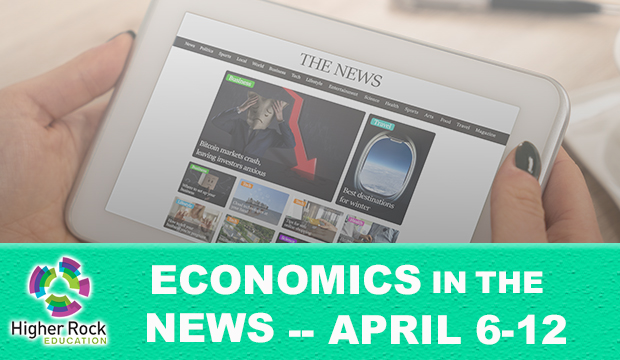Economics in the News – April 6-12
Economics impacts our lives every day. Below are some of the top storylines from this past week in economic news.
- Telecommunications companies reported that more people are taking the time to call their loved ones amid social distancing measures caused by the coronavirus. Verizon has averaged 800 million phone calls per day -- more than double the number made on Mother’s Day, which is normally one of the busiest days for phone calls. [New York Times]
- The managing director of the International Monetary Fund (IMF), Kristalina Georgieva, announced that the IMF expects that the coronavirus will cause the worst global economic downturn since the Great Depression. The organization is expected to release its latest world economic forecast Tuesday, April 14. [Associated Press]
- The Federal Reserve announced a new $2.3 trillion stimulus package to provide loans to support the areas that have been hit hardest by the coronavirus, including small businesses, consumers, states, and municipalities. The Fed’s primary objective is to provide enough liquidity to prevent the lack of funds from being the reason for a business closing or for a government not being able to provide necessary services. [CNN Business]
- With many around the world following shelter-in-place orders and practicing social distancing, consumers are more reliant than ever on delivery services for grocery and food orders. Grocery delivery services like Instacart are struggling to keep up with the uptick in demand. [TIME]
- Dairy farmers are instructed to dump their milk because farmers are having a difficult time getting their dairy products to market because truckers are not working due to fear of contracting the virus. [Reuters]
- More than one in 10 American workers have lost their job in the past three weeks due to the coronavirus outbreak forcing businesses to temporarily close or cut back because of the shelter-in-place government orders. 6.6 million people filed for unemployment in the United States during the week ending April 4, bringing the initial filings for unemployment benefits to a staggering 16.8 million Americans in just three weeks. [NPR]
- Retail has been hit hard by COVID-19. Workers have been let go and an estimated 60% of U.S. retail stores have temporarily closed their doors. With stores that sell non-essential goods closed, it is challenging to remain relevant when online shopping is more popular than ever. [Associated Press]
